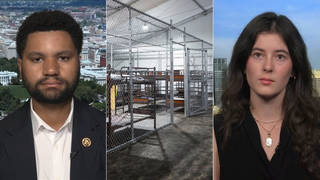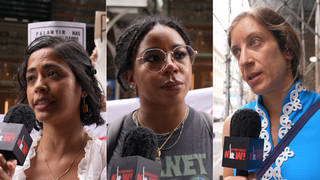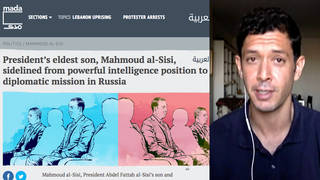
Al Jazeera journalist Peter Greste has been released from an Egyptian prison after 400 days behind bars. Greste and two of his Al Jazeera colleagues, Mohamed Fahmy and Baher Mohamed, were convicted on terrorism charges in a case widely denounced as a sham. Greste flew to Cyprus on Sunday following his release, but Fahmy and Mohamed remain behind bars. “We are relieved by this great news,” says Delphine Halgand, U.S. director of Reporters Without Borders, of Greste’s freedom. “But we have to continue to work to assure the release of all journalists in Egypt who are detained on spurious charges.” Halgand also discusses the violence directed against journalists worldwide in the first month of 2015, including attacks on journalists in France and Iraq and the beheading by ISIS of Kenji Goto, a Japanese reporter kidnapped in Syria last year. Video of Goto’s execution emerged over the weekend.
Transcript
AMY GOODMAN: We turn to Egypt, where after 400 days Al Jazeera journalist Peter Greste has been released from prison. Peter Greste left a Cairo jail on Sunday and was quickly deported. He and two of his Al Jazeera colleagues, Mohamed Fahmy and Baher Mohamed, were convicted on terrorism charges, including “spreading false news” in support of the Muslim Brotherhood, deemed by the government a terrorist group. Canadian-Egyptian Fahmy and Egyptian national Mohamed are still imprisoned. The three were initially sentenced to seven to 10 years, but earlier this month an Egyptian court ordered a retrial. The managing director of Al Jazeera English, Al Anstey, spoke in Doha after Greste’s release.
AL ANSTEY: We spoke to Peter earlier on this afternoon, just after he was released from detention. And I can’t tell you how relieved we are that Peter has left Egypt and is on his way to be reunited with his family. It’s a day of very mixed emotions, and I think we’ve got to focus on the fact that Baher and Mohamed are still behind bars 400 days after being taken into detention, and that injustice needs to come to an end. They are guilty of nothing apart from great journalism.
AMY GOODMAN: Egyptian authorities accuse Al Jazeera of being a mouthpiece of the Muslim Brotherhood. Of course, the three journalists absolutely deny this and all the charges against them. The timing of Greste’s release came as a surprise, just days after Egypt suffered one of the bloodiest militant attacks in years. More than 30 members of the security forces were killed last Thursday in Sinai. Australian foreign minister said Greste flew to Cyprus from Cairo.
JULIE BISHOP: [I spoke to Peter Greste] shortly after his release and before he departed Egypt. He was immensely relieved, and he was desperate to come home to Australia and reunite with his family—his parents, Lois and Juris, and his brothers, Michael who is with him and his other brother Andrew.
AMY GOODMAN: To talk more about the implications of Peter Greste’s release and the fate of his two colleagues still in jail, we go to Washington, D.C., to speak with Delphine Halgand, U.S. director of Reporters Without Borders.
Welcome back to Democracy Now!, Delphine. Talk about the significance of Peter Greste’s release and why you think it happened now.
DELPHINE HALGAND: So, of course, we are all relieved by this great news, but we have now a lot of work to do still, because we have to continue to work to assure the release of all the journalists in Egypt who are detained on spurious charges, including the Al Jazeera journalists, but there are even more Egyptian journalists who are still detained on spurious charges. So it seems that the international pressure worked, and we have to continue to do so. But I just want to highlight once again that actually the new Egyptian constitution, adopted under President Morsi, actually guarantees freedom of expression, freedom of opinion, media independence. So, once again, we urge the Egyptian authorities to just implement their own constitution.
AMY GOODMAN: [Peter Greste was] deported to Australia, and the fiancée of Mohamed Fahmy says, “Deport Mohamed back to Canada.” What is happening in his case?
DELPHINE HALGAND: We are actually really looking at the news, because we hope that after Peter Greste’s release yesterday there would be the release of the two other Al Jazeera journalists in the coming days, in the coming hours. So, we know that the Canadian government has been very active, of course, on this case, and we are really hopeful that there could be a good end to at least this Al Jazeera case. But we don’t have to forget the dozens of Egyptian journalists who are also detained on spurious charges and who don’t have the same support from the international community.
AMY GOODMAN: In the case of these three men, now two still in prison, why were the Al Jazeera reporters targeted?
DELPHINE HALGAND: So, it’s really important, in fact, to understand this historic perspective. So, first you have to remember that all governments in place after the fall of Mubarak have tried to control the media and tried to control the information as much as possible. In a sense, we have seen a Morsification of the media, and now we are seeing a Sisification of the media. But it’s also important to have in mind that the media freedom really declined since the army seized power and since Sisi is in power. Dozens of journalists have been arrested these last two years. Six journalists have been killed even during a pro-Morsi demonstration. And now, right now, what we are seeing is that all media considered to be linked to the Muslim Brotherhood are persecuted. And Al Jazeera is one of the main targets of this witch hunt.
AMY GOODMAN: Delphine, I wanted to turn to other news about reporters. I wanted to turn to Kenji Goto, the Japanese journalist beheaded by Islamic State militants. Video of his execution emerged over the weekend. Junko Ishido, Goto’s mother, led tributes to her son in Tokyo.
JUNKO ISHIDO: [translated] I cannot find the words in the face of such a heartbreaking death. I can only express this grief with tears. I wish to continue to believe in Kenji Goto’s wish for a world without war and in his work to save the children from poverty and war.
AMY GOODMAN: Meanwhile, on Monday, Japanese Prime Minister Shinzo Abe reignited the debate on changes to the extent its military can operate overseas, by saying the country would look into ways of rescuing its citizens if another hostage crisis happens.
PRIME MINISTER SHINZO ABE: [translated] Currently, at the moment, if a Japanese citizen or someone with an NGO is in a dangerous situation, it is necessary to, of course, have permission from the country they are in, but they can only be transported out by Japan, but not rescued. We would like to start a discussion so that it will be possible for Japanese citizens to be rescued, as well.
AMY GOODMAN: That’s the Japanese prime minister, Shinzo Abe. Delphine Halgand, if you can talk about what happened?
DELPHINE HALGAND: I think there is no word, as the mom, the mother of this journalist, said. But I just would like to highlight again that 2014 and the beginning of 2015 have been marked by an extreme level of violence targeting journalists, from Syria to France. And what we have seen is that the murders are more and more barbaric, but also we have seen the apparition of a barbaric propaganda, with carefully staged beheadings of Western journalists, but also public execution of local journalists, like in Iraq, and, again, a barbaric propaganda with the Charlie Hebdo attack.
And one other comment that I would like to make is that in these last two years we have seen an increase, an explosion, in the number of journalists kidnapped all around the world, especially, again, in Syria, Libya, but also Ukraine. And again, I want to highlight one point. Ten percent of the journalists kidnapped right now are Westerners, but 90 percent of the journalists kidnapped right now are locals. And again, we don’t have to forget that ISIS, by example, is kidnapping and is executing more local journalists than foreigners. And we have to keep that in mind to understand how, actually, the Islamic State is holding hostage journalists, is killing journalists, but at the end, their main target is really the information and all freedom to all of us, in Iraq, in Syria and all over the world, to be informed.
AMY GOODMAN: Delphine Halgand, I want to thank you for being with us. And I want to end by going to comments from Mohamed Fahmy, who has criticized the Canadian government, saying they haven’t done enough to free him. Again, he is a Canadian Egyptian. Canada has refused to even directly call for his release, saying only they have deep concerns about his case. In a statement last month, Mohamed Fahmy said, quote, “I understand that the ability of the Canadian government to help me is limited by the rules of diplomacy. But I do believe that Prime Minister Harper could do more to obtain my release if he were to directly intervene in our case.” Delphine Halgand, thanks so much for being with us from Washington, D.C., U.S. director of Reporters Without Borders. Oh, and happy birthday.
DELPHINE HALGAND: Thank you.
AMY GOODMAN: This is Democracy Now!, democracynow.org, The War and Peace Report. When we come back, it was television’s, it was NFL’s biggest day yesterday, the Super Bowl. But we’re going to talk about, well, sexual abuse, domestic violence and what its links are to the Super Bowl. Stay with us.













Media Options